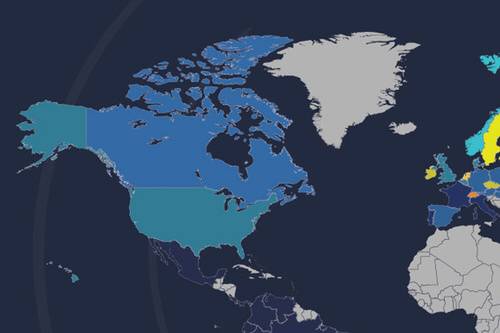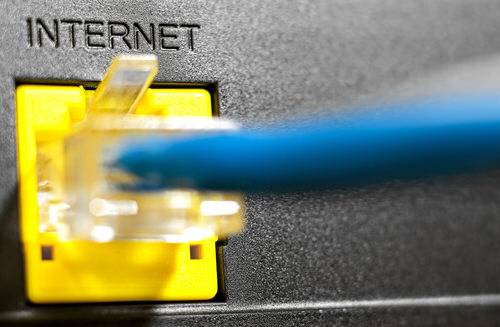By global standards, U.S. broadband speeds are slow—and getting slower. In Akamai’s worldwide ranking of Internet speeds, the U.S. recently dropped from 12th place to 14th, lapped by Denmark, Norway … and Romania.
True, in absolute terms, U.S. speeds are still edging upward. In the second quarter, for instance, average broadband speeds in this country rose to 11.4 megabits per second (Mbps), up from 10.5 Mbps in the previous quarter. That’s the good news. Bad news is, the rest of the world is getting even faster.
See also: U.S. Broadband Speed Ranking: We’re Number 14! We’re Number 14!
It is, to say the least, an uncomfortable spot for the country that birthed the Internet to begin with. How did we get here?
The Korean Miracle
Let’s start with a look at global heavyweight South Korea, whose broadband clocked in at 24.6 Mbps in the latest Akamai report—more than twice as fast as the U.S.

Faster data for cheaper prices is a hallmark of the South Korean Internet, largely because of a decades-long government policy promoting broadband infrastructure and industrial competition.
For South Korea’s policymakers in the 1990s, connectivity was the key to economic recovery. So the country concentrated on establishing the infrastructure that would later carry high-speed Internet. The government also made sure providers couldn’t hog those pipes monopolistically, as many U.S. cable and broadband providers do. Result: Open South Korean networks stoke fierce competition, lower costs and deliver blazing speeds.
Granted, South Korea is a small, dense peninsula with a land mass of just 38,691 square miles—about one-fifth the size of California. Wiring that up would be an easier feat than in the U.S.
But it surely doesn’t help that, when it comes to prioritizing high-speed Internet, the U.S. seems to be the country with its head under water.
A Lesson From The Romanians

Previously, Norway and Romania ranked lower than the U.S., which essentially tied with Denmark. Now the U.S. is edged out by all three.
Perhaps that shouldn’t be surprising. For instance, the Romanian government has been pushing for faster broadband, and is continuing to build out fiber and wireless Internet infrastructure while also promoting commercial competition.
It’s a fairly activist policy, too. One of the government’s main principles, according to this ITU report, is to “[m]aintain the obligation to provide access to the local loop on the incumbent.” In other words, the company that built out a fiber network has to agree to let rival services use its network (usually for a fair and reasonable fee). Such policies are fairly common among the 13 countries with faster broadband than the U.S.
Nothing like it, of course, exists in the U.S. The telecom policy here, by contrast, tends to “nudge” industry more than “push.”

America’s broadband future lies mostly in the hands of the telecommunication companies. It’s been that way since America Online, GeoCities and dial-up modems ruled the online roost.
Around the time South Korea’s regulators grabbed their Internet pipes by the fist, the U.S. passed the Telecommunications Act of 1996, a piece of legislation with a looser regulatory hold. According to the Federal Communications Commission, the idea was to stimulate jobs and economic growth. So it’s making the telcos responsible for the literal nuts and bolts of building out networks, and letting them compete unfettered.

Nearly a decade later, the critics weigh in with a verdict on that policy: This master plan is an utter flop.
The Need For Speed
President Obama seems more focused on connecting schools than advancing the nation’s competitive technological standing on the world stage. Then again, that might be the best he can do in the face of partisan politics and a divided Congress, which could roadblock even the best of intentions.

Not that the federal government has been sitting idle. Getting remote areas wired for broadband of any sort is a Herculean task for a country with huge expanses of open territory. The FCC has also had its hands full fighting the net neutrality battle, putting mobile carriers in the hot seat and scrutinizing hotels over sketchy Wi-Fi policies.
See also: How This Hotel Made Sure Your Wi-Fi Hotspot Sucked
Meanwhile, all the broadband providers seem to want to do is protect their own turf.
In the U.S., we pay more than five times for broadband than South Korea’s citizens. And for what? Apparently so the cable companies can spend it buying out rivals. Others are busy begging the FCC not to redefine broadband, from 4 Mbps to 10Mbps, saying people in the U.S. find current speeds perfectly adequate. (Cue facepalm.)
If that sounds lame to you, you’re not alone. FCC Chairman Tom Wheeler thinks so too: “Meaningful competition for high-speed wired broadband is lacking and Americans need more competitive choices for faster and better Internet connections,” he said in a speech in Washington, D.C. last month.

By his estimation, “three-quarters of American homes have no competitive choice for the essential infrastructure for 21st century economics and democracy.”
All it takes is one look at the technology on the horizon to know he’s spot-on.
America’s Still Barely Online, As 4K Looms
Whether our speeds are good enough for now is one thing. Whether they can handle the increasing data demands of the future is another. Take 4K, for instance.
Also known as UltraHD or ultra-high definition, 4K is a data-heavy technology that puts highly detailed visuals on televisions and other displays.
While not widespread yet, movie studios and distributors are already gearing up for 4K movies, and companies like Samsung, Panasonic, Acer and Sony have started putting 4K cameras in their smartphones.

It takes big, speedy pipes to serve up so much data. And it’s not clear if we will be ready to handle it. Sure, some Americans benefit from Google Fiber or other super-fast gigabit Internet alternatives. But they’re too geographically limited now to make a real dent on a meaningful scale.
According to Akamai, the top regions for 4K readiness can handle speeds faster than 15 Mbps. If the U.S. could meet that, it would vault us to number 3 on the global speed chart. But we have a long way to go.

Lead photo by Elena Gatti; President Obama photo from Everett Collecton/Shutterstock; photo of Tom Wheeler by Free Press; Samsung Galaxy S5 photo by Adriana Lee for ReadWrite; Nadia Comaneci photo by Ben Sutherland; map and bar chart graphics by Nigel Sussman and Madeleine Weiss for ReadWrite









